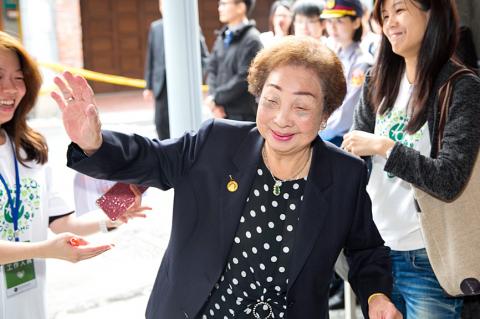Chen Lien-hua (陳蓮花), one of three known surviving former “comfort women” in Taiwan, died of intestinal infection on Thursday at the age of 93, said the Taipei Women’s Rescue Foundation, a group that advocates for the rights of former Word War II comfort women.
Chen was taken to hospital last month when she complained of stomach pain. Doctors said her intestines had torn.
After surgery, Chen became very weak. She died with her family at her side, doctors said.

Photo provided by Taipei Women’s Rescue Foundation
Born in Taiwan in 1924, Chen was given up for adoption and from a young age worked at a factory. When she was 19, a Japanese person came to the factory under the guise of recruiting “caregivers” and took more than 20 women, including Chen, by boat to the Philippines.
After arriving in the Philippines she and the other women were forced into “sexual slavery” for Japanese soldiers.
After nearly two years in the Philippines, she was one of only two of the more than 20 Taiwanese women taken as comfort women who returned to Taiwan alive, the foundation said.
Chen married a Taiwanese man she met in the Philippines, who was a Japanese Imperial Army soldier.
Chen was initially reluctant to tell people her story for fear of being shamed, but later she agreed to help the foundation and others raise awareness about this often overlooked period in history.
She said she was touched by the care and support shown to her by social workers and others working for redress and fighting for justice for the women.
Chen often attended public activities to tell her story and criticize the then-Japanese military’s inhumane treatment and urge the Japanese government to apologize.
In December last year she attended the opening ceremony of the Ama Museum.
“Seeing all of you with so much love in your heart, taking care of Amas; I am really grateful,” she said at the ceremony.
Ama means “grandma” or “elderly woman” in Hoklo (commonly known as Taiwanese).
However, as she predicted, Chen did not receive an apology from the Japanese government for her sexual slavery, the foundation said on Friday.
She told international media with tears in her eyes: “We are very old. We may be long gone when Japan is happy enough to make compensation.”
The last two known Taiwanese surviving former comfort women are Aborigines who live in Hualien County, the foundation said.

Alain Robert, known as the "French Spider-Man," praised Alex Honnold as exceptionally well-prepared after the US climber completed a free solo ascent of Taipei 101 yesterday. Robert said Honnold's ascent of the 508m-tall skyscraper in just more than one-and-a-half hours without using safety ropes or equipment was a remarkable achievement. "This is my life," he said in an interview conducted in French, adding that he liked the feeling of being "on the edge of danger." The 63-year-old Frenchman climbed Taipei 101 using ropes in December 2004, taking about four hours to reach the top. On a one-to-10 scale of difficulty, Robert said Taipei 101

A preclearance service to facilitate entry for people traveling to select airports in Japan would be available from Thursday next week to Feb. 25 at Taiwan Taoyuan International Airport, Taoyuan International Airport Corp (TIAC) said on Tuesday. The service was first made available to Taiwanese travelers throughout the winter vacation of 2024 and during the Lunar New Year holiday. In addition to flights to the Japanese cities of Hakodate, Asahikawa, Akita, Sendai, Niigata, Okayama, Takamatsu, Kumamoto and Kagoshima, the service would be available to travelers to Kobe and Oita. The service can be accessed by passengers of 15 flight routes operated by

Taiwanese and US defense groups are collaborating to introduce deployable, semi-autonomous manufacturing systems for drones and components in a boost to the nation’s supply chain resilience. Taiwan’s G-Tech Optroelectronics Corp subsidiary GTOC and the US’ Aerkomm Inc on Friday announced an agreement with fellow US-based Firestorm Lab to adopt the latter’s xCell, a technology featuring 3D printers fitted in 6.1m container units. The systems enable aerial platforms and parts to be produced in high volumes from dispersed nodes capable of rapid redeployment, to minimize the risk of enemy strikes and to meet field requirements, they said. Firestorm chief technology officer Ian Muceus said

MORE FALL: An investigation into one of Xi’s key cronies, part of a broader ‘anti-corruption’ drive, indicates that he might have a deep distrust in the military, an expert said China’s latest military purge underscores systemic risks in its shift from collective leadership to sole rule under Chinese President Xi Jinping (習近平), and could disrupt its chain of command and military capabilities, a national security official said yesterday. If decisionmaking within the Chinese Communist Party has become “irrational” under one-man rule, the Taiwan Strait and the regional situation must be approached with extreme caution, given unforeseen risks, they added. The anonymous official made the remarks as China’s Central Military Commission Vice Chairman Zhang Youxia (張又俠) and Joint Staff Department Chief of Staff Liu Zhenli (劉振立) were reportedly being investigated for suspected “serious